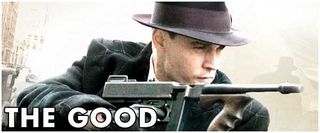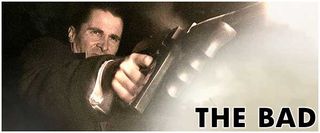
I assume that this is exactly how my high school teachers felt about me all those years ago. Public Enemies was good, but it could’ve been so much better. It could’ve graduated with honors, gone to a really nice, private college like USC, walked away from there in four years rather than five. Instead, it settled for being what it was: a better-than-average biopic about a really interesting guy that most everyone already knows about.
As a viewer, I couldn’t have been more torn about the outcome of Michael Mann’s newest foray into the gangster underworld. It has an intriguing figure to paint a portrait of. It’s shot beautifully. The acting is mostly good. But you can’t help but walking out of the theatre feeling disappointed, feeling as though Michael Mann could have brought so much more to the table. Apparently he just didn’t feel like it. I know how that is. I walked away from Public Enemies conflicted, at war with myself over whether this thing was any good. Here's what's been fighting for control inside my head, 5 reasons for and against:

John Dillinger or Why Did My Generation Get All The Psycho Bomber Criminals?
John Dillinger is a different kind of villain in that he’s not one. It’s impossible not to see why a cult of Dillinger fans has emerged in recent decades; Public Enemies portrays him as less of a criminal and more of a guy just trying to have some fun and make some dough. How can you hate that? The dude’s got a quick wit, he’s good-looking, and he’s going up against those douchey, uptight FBI guys. Early on in the movie, Melvin Purvis has a meeting with Dillinger, very similar to the one we see between Batman and the Joker in The Dark Knight. Purvis asks Dillinger, “What keeps you up at night?” Dillinger replies, “coffee.” Now how can anyone root for Purvis after that?
The HD Digital Format or I Can Totally See Christian Bale’s Nose Hairs!
Simply stated, this flick looks gorgeous. A lot of people were against the idea of shooting a period movie in the crispness of digital format, but what’s the point in making advances in film technology if people think it’s “so lame” to use it just because of the movie’s time period? Everything is crystal clear here, in a way that we’ve never seen in a movie about this era. When Melvin Purvis takes a few shots at some criminals while hanging out of the window of his Ford, the flashes from the gun light up the screen in a way that’s hard to describe but thoroughly awesome. Michael Mann knew what he was doing with this format. We see these costumes, these settings, and these scenes through a whole new lens, and although we’ve seen them a million times before, they’ve never looked clearer.
The Escapes or What I Wouldn’t Give to See Dillinger Take on David Blaine
CINEMABLEND NEWSLETTER
Your Daily Blend of Entertainment News
What John Dillinger did could never happen in this day and age. Technology would never allow it. Electric fences, cameras, GPS. Even if a prisoner gets away, he’s not getting far (unless of course, his name rhymes with Osama Bin Laden), so to watch Dillinger find new, better, faster, and more hilarious ways to get out of prison is like watching a real life Bugs Bunny outsmart Elmer Fudd over and over again. Each time Dillinger gets put behind bars, it’s hard to imagine how he’ll find his way out again, yet each time he surprises us. To give away these breakouts would be to spoil one of the best parts of the movie, so I’ll leave specifics out, but just make sure you don’t take any pee breaks when the Army guards come into the pictures. It’ll be worth the bladder damage.
The Scene Where Dillinger Goes To That Place That I Won’t Mention Here
[SPOILERS!] There hasn’t been a moment so quietly hysterical as the one where John Dillinger, after years of hiding, escaping, and avoid the FBI, walks right into the Chicago Police Department, finds the office dedicated solely to locating him, and walks around unnoticed. The subtlety of this scene’s implications is unmatchable. The office is either working too hard or playing too much to open their eyes and realize the obvious places to find Dillinger, even when he’s right in front of their faces. Dillinger stares at his former friends; all have passed due to the life they lived, the one that he lived with them. He’s an arrogant show-off, but right here, we see a lonely man who knows he’s reaching the end of his fun.[/SPOILERS]
Johnny Depp or Reasons to Hope That Maybe They’ll Bring The Joker Back
I lost track of how many people were rumored to be in talks to play the Joker in The Dark Knight, but Public Enemies proves that Johnny Depp could have or should have been one of them. While not nearly as psychotic as Ledger’s Joker, Depp plays Dillinger as a witty, quick thinking, and meticulous criminal who’s above the law and easy to love and hate. For Dillinger’s later years, Depp provides a portrait of the man that allows us to see just how lonely and tired he’s become. He doesn’t want to steal; he has to. It’s part of his DNA. We constantly want the bad guy to win even though we know he won’t, and we want this because of Johnny Depp.

Christian Bale or I Know An Igneous Rock That Would’ve Wanted This Part
Maybe it’s because he didn’t have much to work with. Maybe it’s because I still have that Terminator set taping ringing in my ears. Maybe it’s because we weren’t meant to like Melvin Purvis in the first place. I’m not sure, but Christian Bale may as well have been replaced by a mute sandstone boulder. The guy has no emotion, no depth, and no reason for me to care about him. Is there a reason why he’s in law enforcement? A reason why he’s so reserved? A reason why he comes off as more of a character from I, Robot than a 20s gangster flick? I don’t need everything handed to me, but give me something Bale! Flutter your eyes! Grit your teeth! Twitch! Anything!
The Gunfights or Lessons In Shooting Dudes Shooting Guns in a Forest
Michael Mann should’ve had this down. He’s getting graded on a different scale than most directors in this category because of his previous work. The guy knows gunfights, and these gunfights are boring, long, and seemingly pointless. A little more than halfway through the movie, we’re subjected to a 20-minute gunfight between Purvis and Dillinger’s respective crews. This turns out to be a depiction of The Battle of Barrington, the infamous shootout that ended in Babyface Nelson’s death. And while the shootout is relevant to the history of the character, it seems hardly relevant to the movie. Ten minutes could have been cut from it, and the flick would have been stronger for it. I don’t get it. Mann gave us a 2 hours gunfight in Heat and it was awesome. Why couldn’t he make a 20-minute fight interesting?
The B Characters or I Have Friends From High School That I Care More About Than These Characters
The real rising action, conflict, and climax here have everything to do with Dillinger and his relationship with Purvis and the young FBI. Anything else in this film is extra scraps, yet far too much screen time ends up getting taken by characters like Babyface Nelson and Dillinger’s coat rack girlfriend, Billie Frachette (more on her next). These characters are never fully developed, and in Babyface’s case, never even fully introduced, which makes the story more confusing than it has to be. In place of these throwaway characters, more depth could have been added to Dillinger and Purvis, thus making the movie the far more thoughtful piece that I, for one, expected from Mann.
The Love Story or Love Story? More Like Love SNOREy!
So maybe real life John Dillinger needed Billie Frachette. Maybe she was the only woman he ever truly loved. Maybe there was more to their relationship than this movie can tell us with the little screen time given to the couple. But the truth is, not even Michael Mann can build a solid relationship in a flick with maybes. Instead of seeing a love wrapped in layer upon layer, Public Enemies instead gives us about 30 minutes of the most typical love story possible, only to contrast it with a John Dillinger that hardly seems like the type to distract himself with a silly little thing called love. Either make this relationship worth it or throw it out! Just sayin’, Mann.
Johnny Depp or Wait, This Wasn’t Pirates of the Caribbean: Back to the Future Edition?
Sure, Depp brings his A game to Public Enemies, but I wouldn’t argue with anyone who says that Depp is just playing a toned down, 30s version of Captain Jack Sparrow. Just like Sparrow, Depp’s Dillinger is an irreverent and clever joker. Give the dude a parrot and some gold teeth and we’ve got ourselves a time traveling Pirates movie. So is Depp acting or just playing Depp? It’s impossible to say, I suppose, but when was the last time you saw him and that Somali pirate kid in the same room? Suspicious, ain’t it?
Most Popular






